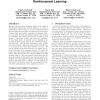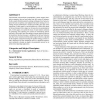246 search results - page 26 / 50 » Learning behavior styles with inverse reinforcement learning |
KDD
2002
ACM
14 years 8 months ago
2002
ACM
Recently, there has been increasing interest in the issues of cost-sensitive learning and decision making in a variety of applications of data mining. A number of approaches have ...
ACMICEC
2008
ACM
13 years 9 months ago
2008
ACM
Conventional conversational recommender systems support interaction strategies that are hard-coded into the system in advance. In this context, Reinforcement Learning techniques h...
JCST
2010
13 years 2 months ago
2010
In this paper, we examine an emerging variation of the classification problem, which is known as the inverse classification problem. In this problem, we determine the features to b...
CORR
2011
Springer
13 years 2 months ago
2011
Springer
Modeling the behavior of imperfect agents from a small number of observations is a difficult, but important task. In the singleagent decision-theoretic setting, inverse optimal co...
DAGSTUHL
2003
13 years 9 months ago
2003
This chapter presents a generic internal reward system that drives an agent to increase the complexity of its behavior. This reward system does not reinforce a predefined task. It...


